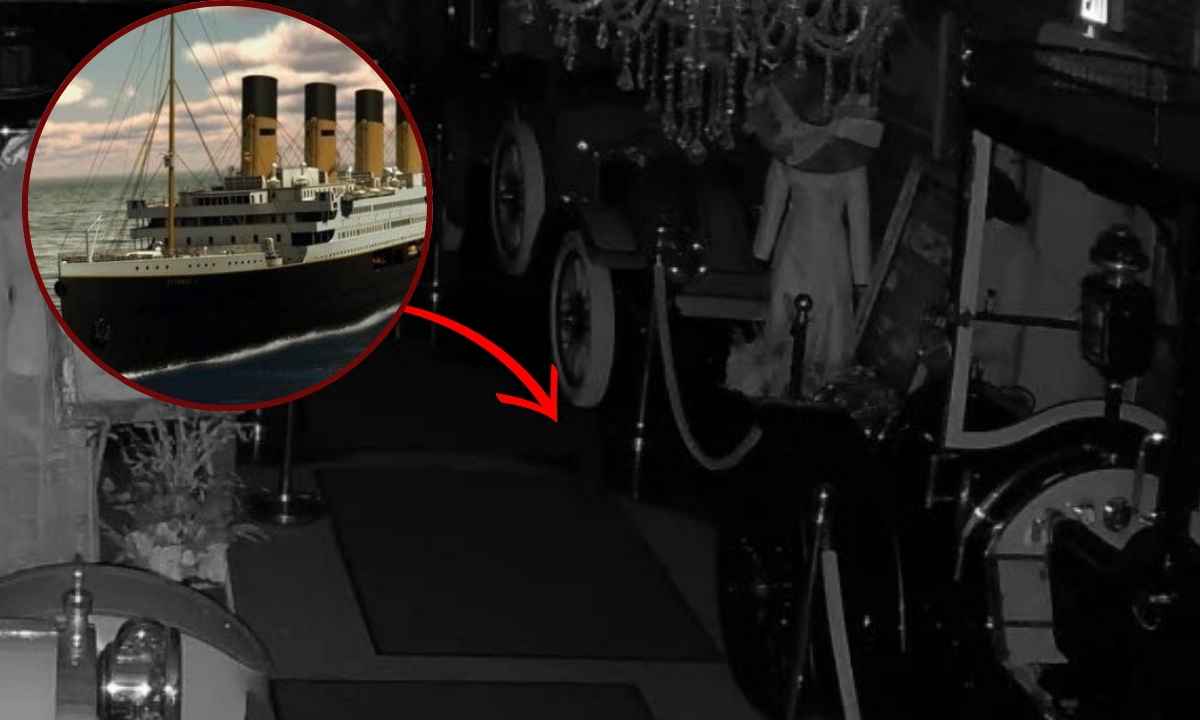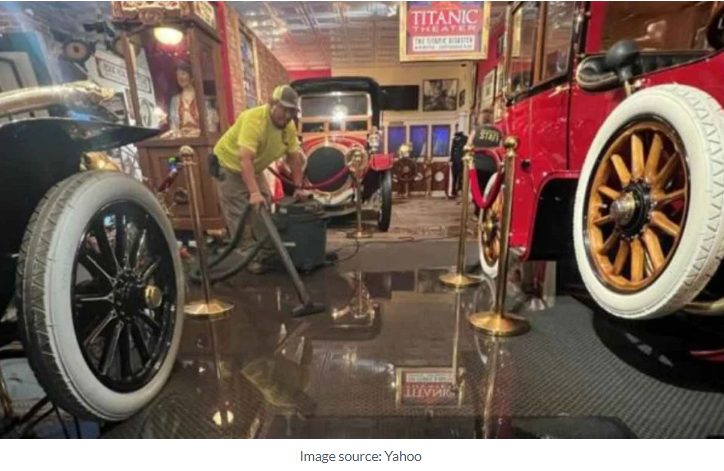story
‘Titanic’ Exhibit Underwater With An Unexplained Flooding!

The Volo Museum in Illinois houses a remarkable $6 million Titanic exhibit, offering an immersive journey back to the early 20th century. This exhibit showcases artifacts and tells the gripping stories of the ill-fated ocean liner, Titanic. However, on June 25, 2024, a mysterious flood swept through the museum, leaving both staff and visitors baffled. The eerie event, captured on camera, sent chills down the spines of many, as the footage seemed to evoke haunting scenes reminiscent of the iconic Titanic film.
The Mysterious Flood
The Titanic exhibit at the Volo Museum in Chicago was disrupted by an unexpected and mysterious flood. Surveillance footage captured the startling moment when water abruptly began pouring into the building, leaving staff and visitors stunned.
“This is the first flood to happen in this building in 40 years. We thoroughly inspected everything, and there were no broken pipes, roof leaks, or any other obvious points of entry for such large amounts of water. Even the perimeter of the building, with a concrete floor, was dry with no evidence of cracks or holes. The flood is a total mystery.”
Brian Grams, the museum director, expressed his confusion.

The car in question is a rare 1912 Renault French concept car, of which only two were ever made. One was aboard the Titanic and now lies at the bottom of the ocean, while its sister car is a highlight of the Volo Museum’s exhibit. Intriguingly, this very car became the center of attention during the recent flooding incident at the museum. The flood’s unexplained origin, beginning directly beneath the vehicle, adds an air of mystery to its already captivating history.
“Watching the water rush in on the footage eerily resembled scenes from the Titanic movie. What really gave me goosebumps was watching the flood start from under that car that inspired our entire exhibit.”
Jim Wojdyla, the Marketing Director
Immediate Actions Taken
In the wake of the flooding, the museum staff acted swiftly to dismantle and safeguard the exhibit’s historical artifacts, ensuring they were protected from water damage. Their prompt response was essential in preserving these valuable pieces. While the exhibit was temporarily closed to the public, the incident significantly impacted the museum’s operations. However, plans were quickly set in motion to reopen the exhibit on June 26, 2024, allowing visitors to once again delve into its rich history.
The Titanic Exhibit: A Historical Overview
The Titanic exhibit at the Volo Museum is a prominent attraction, showcasing a collection of artifacts that bring the Titanic’s story to life. Among the highlights is the 1912 Renault French concept car, a rare piece of history tied to the Titanic tragedy. This car is the only surviving model of its kind, as its twin now rests on the ocean floor.
Dedicated to preserving the Titanic’s legacy, the exhibit offers visitors a window into the past through its remarkable collection. Adding to its intrigue, the museum has gained a reputation for paranormal activity, with numerous reports of unexplained phenomena over the years. The recent mysterious flood is yet another enigma to add to the list.
Investigating the Flood
After the flood, officials carried out a comprehensive inspection of the building. Despite their efforts, they found no evidence of broken pipes, roof leaks, or any other apparent source of water intrusion. Even the concrete floor’s perimeter was completely dry, showing no cracks or holes. This absence of any clear explanation has deepened the mystery, leaving experts and
museum officials puzzled.
Interviews with experts on both scientific and paranormal phenomena have yet to provide a clear explanation for the flood. The mystery remains unsolved, fueling further speculation and intrigue
Conclusion
The recent unexplained flooding at the Volo Museum’s Titanic exhibit has intrigued many, intertwining history, mystery, and the paranormal. As the museum prepares to reopen the exhibit, visitors will once again have the chance to explore its unique collection of historical artifacts and experience the eerie events that add to its allure. This incident highlights the enduring fascination with the Titanic and the mysteries that continue to surround its legacy.

story
I Was 90 Years Old When I Adopted a 14-Year-Old Dog

At 90 years old, I made a decision many people said I shouldn’t make.
I adopted a 14-year-old dog named Benson.
By the time Benson arrived at the shelter, his world had already grown painfully small. His previous family brought him in and asked for him to be euthanized—not because he was aggressive, not because he was sick, but simply because he was “too old” and they no longer wanted the responsibility.
The shelter refused.
They saw what his family no longer did: a gentle soul, a quiet heart, and a dog who still had love to give.
When I heard Benson’s story, something deep inside me stirred. At my age, people often tell you what you should and shouldn’t do. They say you should slow down, avoid attachments, and prepare for endings.
But when I thought about Benson, I didn’t think about my age.
I thought about what it feels like to be considered finished while your heart is still very much alive.
So I asked to meet him.
The moment I walked into the shelter, Benson slowly stood up, walked straight toward me, and gently rested his head against my chest. There was no hesitation. No fear. Just trust—like he already knew me, like he had been waiting.
A senior dog and a senior woman. Two souls both overlooked in different ways. Without a single word, we understood each other.
Now Benson follows me softly from room to room, always matching my pace. He naps beside me during quiet afternoons, his gentle breathing filling a house that once felt too silent. I put little sweaters on him to keep him warm, and he wears them proudly—as if they are proof that someone still cares.
People tell me I rescued him.
But the truth is, Benson rescued me.
He rescued me from empty rooms, from long evenings without conversation, and from the quiet loneliness that can settle in when the world starts moving on without you.
Together, we are not racing against time. We are not afraid of it.
We are simply sharing it—slowly, gently, with love.
We are giving each other a final chapter that is warm, calm, and full of meaning.
And that is more than enough.
story
Keanu Reeves: Quiet Kindness in a Loud World

In an industry often defined by excess and self-promotion, Keanu Reeves stands out for a very different reason: his generosity has always spoken louder than his fame.
While filming The Lake House, Reeves reportedly overheard two costume assistants talking. One of them was in tears, facing the loss of her home over a $20,000 debt. Without fanfare or publicity, he quietly deposited the full amount into her account—changing her life in a single, unseen moment.
His approach to wealth has always been refreshingly simple. On his birthday in 2010, instead of throwing a lavish party, Reeves walked into a bakery alone, bought a muffin, placed a single candle on it, and sat outside enjoying the day. As he ate, he offered coffee and pastries to strangers passing by. For him, that was luxury enough.
After the massive success of The Matrix trilogy, Reeves shocked Hollywood again—this time by giving away an estimated $50 million of his earnings to the special effects and costume teams. He believed they were the real heroes behind the films’ success, and he wanted their contributions recognized in a tangible way.
Known for performing many of his own stunts, Reeves deeply respects the professionals who help bring action scenes to life. As a gesture of gratitude, he famously gifted each of his stunt doubles a Harley-Davidson motorcycle. It wasn’t about show—it was about appreciation.
Despite his global fame, Reeves continues to live with striking humility. He regularly uses public transportation, including subways and buses, simply because it’s practical. He’s never treated these choices as statements—just normal parts of everyday life.
His generosity extends far beyond individual moments. Over the years, multiple hospitals have reported receiving donations totaling tens of millions of dollars from Reeves. In some films, he even donated up to 90% of his salary so productions could afford to hire other actors, strengthening the final result rather than boosting his own paycheck.
In 1997, a paparazzo captured an image that quietly defined him: Reeves sitting on the sidewalk with a homeless man, listening intently to his story and sharing breakfast. No cameras invited. No headlines sought.
What makes these stories remarkable is that none of them came from Reeves himself. Every act of kindness became known only because someone else’s life was touched by it. He has never tried to build a reputation around his generosity—it simply exists.
Despite personal tragedies and hardships that could have hardened anyone, Keanu Reeves chose a different path. He chose empathy over ego, simplicity over excess, and kindness over noise—becoming a rare reminder that true character doesn’t need an audience.
story
Gloria Steinem: The Woman Who Went Undercover to Expose the Truth Behind the Playboy Fantasy

Before she became the face of modern feminism, Gloria Steinem was an ambitious young journalist trying to be taken seriously in a male-dominated world. In 1963, she accepted an assignment that would change her life — and the way America saw women.
To uncover the reality behind the glamour, Steinem went undercover as a Playboy Bunny at the New York Playboy Club. From the outside, it seemed like a world of elegance and excitement — cocktails, celebrities, and a promise of luxury. But what she discovered beneath the satin ears and fishnet stockings was a very different story.
Behind the Bunny Ears: A Reality Few Saw
The job demanded constant smiles, perfect figures, and endless patience. The handbook for Bunnies spelled out strict, humiliating rules: never gain weight, keep your tail fluffy, accept flirting politely, and never complain.
Steinem soon realized the glamour was only a disguise for exhaustion, low pay, and everyday harassment. Her investigative piece, “A Bunny’s Tale,” ripped away the fantasy and revealed how women’s bodies were being marketed as entertainment. It became one of the most talked-about exposés of its time — and the moment Steinem’s voice began to reshape journalism.
The Struggles That Forged Her Strength
Gloria’s courage didn’t appear overnight. Her childhood was marked by hardship. Her father left when she was young, leaving her to care for her emotionally fragile mother while constantly moving from place to place.
By the time she entered journalism, Steinem already knew what it meant to feel unseen. Editors often handed her “women’s stories” — light features about fashion and lifestyle — while her male peers got political assignments. But she used those very topics to reveal the hidden realities of women’s lives, turning limitations into opportunity.
From Bunny to Icon: The Rise of a Movement
After “A Bunny’s Tale”, Steinem became a symbol of a new kind of feminism. In the 1970s, she co-founded Ms. Magazine, giving women a powerful platform for their voices. With her signature aviator sunglasses and calm determination, she became the public face of women’s liberation — speaking out for reproductive rights, equal pay, and an end to domestic violence.
Even as critics dismissed her for being “too pretty” or “too radical,” Steinem’s focus never wavered. She transformed ridicule into momentum, and silence into social change.
The Reluctant Leade
Despite her fame, Gloria often described herself as “an introvert in public.” She preferred listening to talking, yet carried the expectations of millions of women on her shoulders. Her humility made her message even stronger — a reminder that leadership doesn’t require ego, only courage.
She never sought to be a hero, but history made her one.
A Legacy of Voice and Visibility
Gloria Steinem’s story is more than a chronicle of feminism — it’s about resilience, empathy, and transformation. From a girl who grew up feeling invisible, she became the woman who taught the world to see.
Through disguises, magazine pages, and movements, Steinem gave voice to those who had none — proving that sometimes, to change the system, you have to step inside it first.

 Things To Do2 years ago
Things To Do2 years agoAngel Fire or Red River: Which New Mexico Mountain Town is Right for You?

 Beaches2 years ago
Beaches2 years agoDoes Allegiant Air offer flights to Daytona Beach?

 Beaches2 years ago
Beaches2 years agoIs Driving Allowed on Panama City Beach?

 Travel FAQs2 years ago
Travel FAQs2 years agoWhat are the dimensions of an average hotel room?

 Things To Do2 years ago
Things To Do2 years agoHow Far is the Distance Between Fort Lauderdale and Miami’s South Beach?
- RV CAMPING1 year ago
When a woman wakes up, a random dog is in her bed

 Things To Do2 years ago
Things To Do2 years agoWhy is Hanakapiai Beach considered one of the most dangerous beaches in Hawaii?

 Things To Do2 years ago
Things To Do2 years agoClaridge’s vs The Savoy: Which Hotel Reigns Supreme?

































